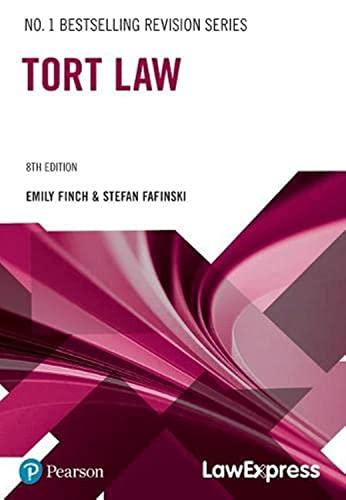Question
The Law on Obligations and Contracts by Hector S. De Leon and Hector M. De Leon, Jr. Chapter 1 - General Provisions The answers must
The Law on Obligations and Contracts by Hector S. De Leon and Hector M. De Leon, Jr.
Chapter 1 - General Provisions
The answers must all be based on the Civil Code of the Philippines.
I. Definitions
Define or give the meaning of the following:
1. obligation
2. quasi-contract
3. compliance in good faith
4. wrong
5. solutio indebiti
II. Discussions
1. What are the essential requisites of an obligation? Give an example to illustrate them.
2. Why are obligations under the Civil Code a juridical necessity? Explain.
3. What are the elements or requisites in order that a person may acquire a right of action in court against another to enforce the performance of the latter's obligation?
4. May a person incur obligations even without entering into any contract or voluntary agreement? Explain.
III. Problems
Explain or state briefly the rule or reason for your answers.
1. X saw at about one (1:00 p.m.) in the afternoon a child alone in a shopping mall. The child who strayed from Y, his mother, was in tears and appeared very hungry. Out of pity, X took him to a restaurant to eat for which he spent P150. Y did not give her consent to the good deed of X. Furthermore, they were on their way home before the child got lost. Is X entitled to be reimbursed by Y for the amount of P150?
2. While the car of X was parked by the roadside, it was bumped at the rear by a jeep belonging to Y. Only the car of X suffered damage. Under the circumstances, does it follow that Y is liable to X for the damage?
3. In the same problem, has X the right to ask indemnity from R, employer of X, on the ground that when the accident occurred, X was then on his way to transact business with a client of R?
4. D (debtor) borrowed P10,000 from C (creditor). On the due date of the loan, D could not pay C because he lost to a robber the P10,000 intended for C. In addition, he suffered financial reverses, and he was short of cash even for his current family's needs. Is D legally justified to refuse to pay C?
Step by Step Solution
There are 3 Steps involved in it
Step: 1

Get Instant Access to Expert-Tailored Solutions
See step-by-step solutions with expert insights and AI powered tools for academic success
Step: 2

Step: 3

Ace Your Homework with AI
Get the answers you need in no time with our AI-driven, step-by-step assistance
Get Started


